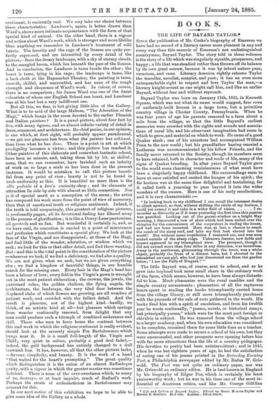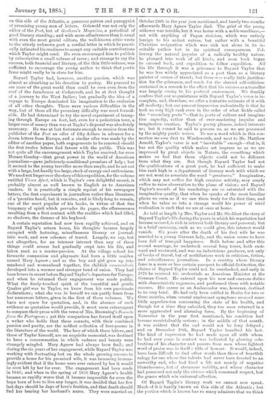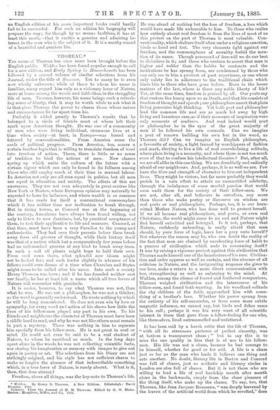BOOKS.
THE LIFE OF BAYARD TAYLOR.* SINCE the publication of Mr. Cooke's biography of Emerson we have had no record of a literary career more pleasant in any and every way than this memoir of Emerson's not undistinguished countryman, Bayard Taylor. The story told in these volumes is the story of a life which was singularly equable, prosperous, and happy; a life that was steadied rather than thrown off its balance by its own great sorrow, because it was by inbred nature pure, veracious, and sane. Literary America rightly esteems Taylor the traveller, novelist, essayist, and poet; it has an even more unimpeachable right to respect and love Taylor the man,—a, literary knight-errant as one might call him, and like an earlier Bayard, without fear and without reproach.
Bayard Taylor was born on January 11th, 1825, in Kennett Square, which was not what its name would suggest, four rows of uniformly-built houses in a large town, but a primitive country village in Chester County, Pennsylvania. When he was four years of age his parents removed to a farm about a mile from the village, so that the little Bayard's earliest memories were crowded with the sights and sounds and associations of rural life, and his observant imagination had room in which to grow, and material on which to work. He came of a good Quaker stock ; one of his ancestors had accompanied William Penn to the new world; but his grandfather having married a Lutheran was excommunicated by his fellow Friends, and the family never returned to the Society, though its members seem to have retained, both in character and mode of life, many of the signs of Quaker breeding. In after years Bayard Taylor gave to the world some charming reminiscences of what must have been a singularly happy childhood. His surroundings seem to have at once satisfied and excited the hunger of his spirit ; the far horizon was at the same time delightful and tantalising, for it called forth a yearning to pass beyond it into the wider wonders of the unseen. Here is one of his early recollections, and it is very characteristic :—
"In looking back to my childhood I can recall the intensest desire to climb upward, so that, without shifting the circle of my horizon, I could yet extend it and take in a wider field of vision I remember as distinctly as if it were yesterday the first time this passion was gratified. Looking out of the garret-window on a bright May morning, I discovered a row of slats which had been nailed over the shingles for the convenience of the carpenters in roofing the house, and had not been removed. Here was, at last, a chance to reach the comb of the steep roof, and take my first look abroad into the world ! Not without some trepidation I ventured out, and was soon seated outside of the sharp ridge. Unknown forests, new fields and houses appeared to my triumphant view. The prospect, though it did not extend more than four miles in any direction, was boundless. Away in the northwest, glimmering through the trees, was a white object, probably the front of a distant barn, but I shouted to the astonished servant-girl, who had just discovered me from the garden below, I see the Falls of Niagara!'" The little Bayard was, of course, sent to school, and as he grew into boyhood took some small share in the ordinary work of the farm, which seems, however, to have been always distasteful to him. Much pleasanter were the rural rambles and the simple country amusements ; pleasantest of all the rapturous hours spent in reading the books triumphantly carried home from the village library, or still more triumphantly purchased with the proceeds of the sale of nuts gathered in the woods. His books fired him with a spirit of emulation, and from his twelfth year he wrote continually, "poems, novels, or historical essays, but principally poems," which were for the most part foreign or chivalric in subject. He was removed from the village school to a larger academy, and, when his own education was considered to be complete, remained there for some little time as a teacher. Some attempts were made to secure a school of his own, but they were unsuccessful, and other prospects were opening before him with far more attractions than the life of a country pedagogue. His devotion to poetry had been unintermittent ; and in 1843, when he was but eighteen years of age, he had the satisfaction of seeing one of his poems printed in the Saturday Evening Post, a Philadelphia newspaper edited by Mr. Rufus W. Griswold, The Post was not quite an ordinary paper, nor was Mr. Griswold an ordinary editor. He is best known in England by his biography of Edgar Poe, which is certainly his least praiseworthy work ; but he was in his time one of the most influential of American critics, and like Mr. George Gilfillan on this side of the Atlantic, a generous patron and panegyrist of promising young men of letters. Griswold was not only the editor of the Post, but of Graham's Magazine, a periodical of good literary standing ; and with more effusiveness than is usual with even the most genial editors, the well-known critic wrote to the utterly unknown poet a cordial letter in which he practically intimated his readiness to accept any suitable contributions which Taylor might send. He even encouraged him to publish by subscription a small volume of verse ; and strange to say the success, both financial and literary, of the thin little volume, was sufficient to encourage the young author to think that poetic fame might really be in store for him.
Bayard Taylor had, however, another passion, which was almost as absorbing as his devotion to poetry. He yearned to see more of the great world than could be seen even from the roof of the farmhouse at Cedarcroft, and he at first thought of a journey to the West Indies ; but gradually the idea of a voyage to Europe dominated his imagination to the exclusion of all other thoughts. There were various difficulties in the way, but of them all the pecuniary difficulty was most formidable. He had determined to try the novel experiment of tramping through Europe on foot, but, even for a pedestrian tour, a larger sum of money than was at Taylor's dispoial was absolutely necessary. He was at last fortunate enough to receive from the publisher of the Post an offer of fifty dollars in advance for a dozen letters from Europe, and a similar offer was made by the editor of another paper, both engagements to be renewed should the first twelve letters find favour with the public. This was not quite all the encouragement which Taylor received, for even Horace Greeley—that great power in the world of American journalism—gave judiciously-conditional promises of help ; but it seemed to the young traveller more than ample, and he set out with a large, but hardly too large, stock of energy and enthusiasm. We need not linger over the story of this expedition, for the volume entitled Views Afoot, which is Taylor's own delightful record, is probably almost as well known to English as to American readers. It is practically a simple reprint of his newspaper letters, the first experiment in journalism rather than literature, of a 'prentice hand; but it remains, and is likely long to remain, one of the most popular of his books, in virtue of that fine buoyancy of spirit which pervades its pages, the effervescence resulting from a first contact with the realities which had filled, as shadows, the dreams of his boyhood.
A certain reputation had now been rapidly achieved, and on Bayard Taylor's return home, his thoughts became largely occupied with lecturing, miscellaneous literary or journalistic work, and new schemes of travel. Largely, we say, but not altogether, for an intenser interest than any of these things could arouse had gradually crept into his life, and taken rank as a master-passion. At the village school his favourite companion and playmate had been a little maiden named Mary Agnew ; and as the boy and girl grew up into manhood and womanhood together, the childish camaraderie developed into a warmer and stronger bond of union. They had been lovers in secret before Bayard Taylor's departure for Europe; and when he returned their engagement was made public. What the finely-touched spirit of the beautiful and gentle Quaker girl was to Taylor, we know from his own passionate declarations ; what she was in herself we can partly learn from her numerous letters, given in the first of these volumes. We have not space for quotation, and, in the absence of such evidence as quotation would provide, it must seem extravagant to compare their prose with the verse of Mrs. Browning's Sonnets front the Portuguese ; yet this comparison has forced itself upon a writer who holds that these sonnets, with their combined passion and purity, are the noblest collection of love-poems in the literature of the world. The love of which these letters, and those of Taylor himself, are an exquisite memorial, was destined to have a consummation in which sadness and beauty were strangely mingled. Mary Agnew had always been frail ; and during the six years of her engagement, while Bayard Taylor was working with fluctuating but on the whole growing success to provide a home for his promised wife, it was becoming increasingly evident that if the home were ever entered by her it would be soon left by her for ever. The engagement had been made in 1846; and when in the spring of 1850 Mary Agnew's health became so rapidly worse that it became impossible for even the hope born of love to live any longer, it was decided that her few last days should be days of love's fruition, and that death should find her bearing her husband's name. They were married on October 4th in the year just mentioned, and barely two Months afterwards Mary Agnew Taylor died. The grief of the young widower was terrible, but it was borne with a noble manliness,— not with anything of Pagan stoicism, which was entirely foreign to his ardent nature, but rather with a beautiful Christian resignation which was rich not alone in its inevitable pathos but in its spiritual consequences. Following the natural impulse of a radically healthy nature, he plunged into work of all kinds, and soon book began to succeed book, and expedition to follow expedition. All his life through it was a grievance to Bayard Taylor that he was less widely appreciated as a poet than as a literary painter of scenes of travel ; but there w2..s really little justification for the grievance, and much for the shrewd self-criticism contained in a remark to the effect that his success as a traveller was largely owing to his poetical endowment. We frankly confess that oar acquaintance with Bayard Taylor's verse is incomplete, and, therefore, we offer a tentative estimate of it with all modesty ; but our present impression undoubtedly is that he took no very high rank even in the order of what Keble called the "secondary poets "—that is, poets of culture and imaginative capacity, rather than of over-mastering impulse and imaginative creation. Taylor's poetry pleases, indeed interests us ; but it cannot be said to poszess us, as we are possessed by the mighty poetic voices. To use a word which in this connection we owe first to Wordsworth, and next to Mr. Matthew Arnold, Taylor's verse is not " inevitable " enough—that is, it has not the quality which makes art impress us as we are impressed by great objects in Nature, the something which makes us feel that these objects could not be different from what they are. But though Bayard Taylor had not the qualifications of a great poet, he had sufficient to make him rank high in a department of literary work with which we are not wont to associate the word "greatness." Imagination, which may not suffice for high creative activity, may amply suffice to raise observation to the plane of vision ; and Bayard Taylor's records of his wanderings are so saturated with the imaginative quality, that when be speaks of the most familiar places we seem as if we saw them truly for the first time, and when he takes us into a strange world his power of vivid realisation is such that we are at once at home.
As told at length by Mrs. Taylor and Mr. Stoddart the story of Bayard Taylor's life during the years in which his reputation had become secured, is rich in interest both literary and personal; but in a brief summary, such as we could give, this interest would vanish. Six years after the death of his first wife he was married to a young German lady, and th,:: union seems to have been full of tranquil happiness. Both before and after this second marriage, he undertook several long tours, both eastward and westward, and was an industrious producer, not only of books of travel, but of multifarious work in criticism, fiction, and miscellaneous journalism. In a country where literary fame is a more or less certain passport to official distinction, the claims of Bayard Taylor could not be overlooked, and early in S78 he received his credentials as American Minister at the German Court. He entered upon his new and onerous duties with characteristic eagerness, and performed them with notable success. His career as an Ambassador was, however, destined to be very brief. He had only been settled in Berlin for two or three months, when several unpleasant symptoms aroused some little apprehension concerning the state of his health, and though for a time they subsided, they too soon returned in a more aggravated and alarming form. By the beginning of November in the year first mentioned, his condition had become unmistakeably serious ; in the middle of that month, it was evident that the end would not be long delayed ; and on December 19th, Bayard Taylor breathed his last. The kind of impression he had made upon all with whom be had ever come in contact was indicated by glowing celebrations of his character and powers from men whose lightest word of praise was in itself r. title of honour. It would, indeed, have been difficult to find other words than those of heartfelt eulogy for one whose fine talents had never been devoted to an unworthy end, who had lived a life not merely of negative blamelessness, but of strenuous nobility, and whose character had possessed not only the virtues which command respect, but the graces which win universal affection.
Of Bayard Taylor's literary work we cannot now speak. Much of it is hardly known on this side of the Atlantic ; but the portion which is known has so many admirers that we think an English edition of his more important books could hardly fail to be successful. For such an edition his biography will prepare the way ; for though by no means faultless, it has at least this merit,—that it excites a genuine and admiring interest in the man who is the subject of it. It hia worthy record of a beautiful and gracious life.








































 Previous page
Previous page